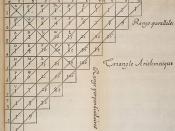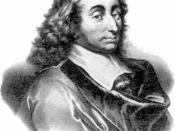Since the beginning of philosophical thinking, mankind has tried to answer the age old question: "Does God Exist?" Some great minds have wrestled this rhetorical question, and out of these minds came various theories. Among these great minds was Blaise Pascal, a French Mathematician, scientist and religious philosopher. As a mathematician, Blaise Pascal has been famed for his independent discovery of the "Pascal's Triangle" (some Chinese guy found the same thing as well), and other works of math. As a scientist, he invented the hydraulic press and the syringe. He also did a lot of work on pressure, hence the name of the unit of pressure. As a religious philosopher, Blaise Pascal investigated the existence of God and came up with an answer unlike any other philosopher before him.
Blaise Pascal's answer was called "Pascal's Wager" or "Pascal's Gambit". "Pascal's Wager" is an argument which encourages belief in God.
The argument states that mankind can never prove the existence of God. The reason is because man depends too much on the 5 human senses to prove or disapprove. Our 5 senses are taste, touch, smell, sound and sight. These 5 senses can only detect atomic matter, which is basically "stuff". If God is omnipotent and omnipresent, God is not going to be made up of atoms, ions, photons, electrons, quarks, etc. Therefore, humans trying to prove the existence of God would be like using a metal detector to prove the existence of water. Therefore, we cannot prove the existence of God in life. Blaise Pascal said that there are only two choices in faith, you believe in God, or you don't believe. If you choose "I don't know if God exists", you still don't believe. Since we cannot prove the existence of God, faith is in...


